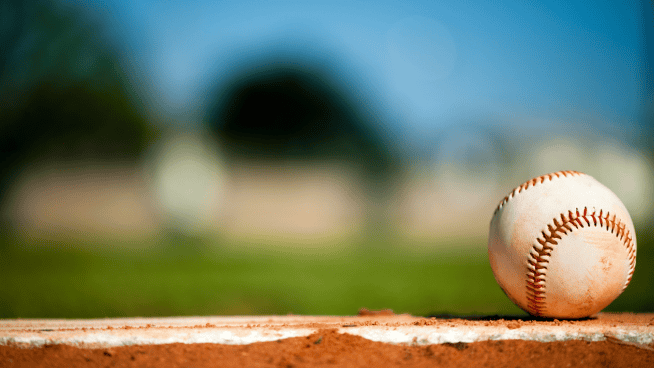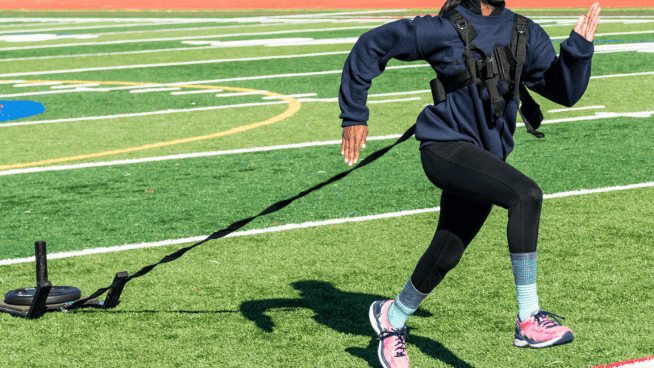Teaching The Balance Between Sports And School
It’s been over two decades since I was a student-athlete. Since then I have been a parent, a full-time worker, a coach, and an active athlete myself. Today I worked a full shift, raced home to fine-tuned my practice plan, zipped off to my training session. After that, I then topped off the night with a couple of chores on the way back home before making dinner and writing this piece. PHEW! How did life get so jam-packed? Unfortunately, I missed out on my workout.
Sometimes as adults, we tend to forget that youth have a busy schedule too. Life already is hard enough already for students, with COVID, zits, after-school jobs, and dealing with friends and family. The task of juggling academics and athletics can be completely overwhelming. This is especially true when a lot of students use athletics as a means for stress relief, daily exercise, and social time. Instead of having the two compete against each other for your attention, find a proper balance between the two, they could very well work together to enhance your life.
More so than ever, being a student-athlete seems to be a full-time job, sometimes even equate to two jobs depending on the demands of your sport. With year-round training, sports have become more stressful and demanding on students (and parents). As a result, students have to learn time management at a younger age, and with that comes a certain level of anxiety and stress. Often students, parents, teachers, and coaches will use sports and academics as a motivational tool to focus on academics and also as a behavioral reminder. For students in high school, add in the pressure of trying to gain notice by a college or university and the possibility of earning a scholarship, and for some individuals, it feels like the weight of the world is on their shoulders.
Keys to Balancing School and Sports
Communication
Most kids struggle with direct communication on the best of days, at least in the form of person to person. However, talking with your teachers and your coaches to advise them of your schedule or asking for help is not a sign of weakness. They may not know how much you have on your plate. Teachers and coaches have been through many of the same situations, so they are likely to be understanding of the situation, especially if you come to them with a plan to help make up for the work or the test. By being respectful and mature, it shows that you are trying to do your best to be a well-rounded student. It is also important to open a line of communication with your teammates and classmates. As your teammates are likely in the same situation as you, maybe they have some tips they can share, or you can make a plan together that will help each other out. As for classmates, it’s important to have some to lean on, especially on those days in which you miss class due to games or tournaments, and you need to borrow some study notes.
Use a Calendar and a Planner
Whether you use a written calendar or a phone app, keeping track of your daily schedule is one of the easiest ways to find balance in your life. Academically, all midterms and final exams are scheduled well in advance, so checking in with your teacher early can help you prepare your study time accordingly. By writing down your practice, training, and games schedule as well as your school requirements and other commitments, you can visually see how much time you have in your day. Don’t forget to schedule brain breaks, travel time, eating, sleeping, and some social time.
Time Management
When you say that you don’t have time to get stuff done, check again. Chances are during your day. You had a few periods in which you could have done some homework or studied—car or bus rides, waiting for practice, lunchtime, in-between tournament games. There are plenty of chances to fit in at least 25 minutes of homework or study time.
Procrastination
It is one of the most dangerous words in the English dictionary. Saying that you will do your homework after just one Netflix show or tomorrow or after practice when you can get it done sooner will have you looking at the clock, wondering where the time went. Would you take the same approach to your workouts or practice? By getting things done and out of the way as soon as possible, it gives you a chance to keep ahead of any deadlines, especially when the unknown comes up and throws you for a loop.
Sacrifice
Something has to go. There are only 24 hours in a day. What are you willing to give up? What are the most important things in your life? This was coming from the guy who is typing at his computer to get an article done about balance and sport rather than taking 30 minutes to get a quick workout in (ok, guilt has taken over, I’ll be right back!). There are always going to be parties, there are always going to be nights out at the movies or video games night, but consider those times to be useful for catching up on schoolwork, studying for a big test, or getting in a couple more reps of practice to make sure you are prepared for game day. There might also be a time in your life when you have to decide on committing to just a few activities or even focusing on one. Remember, there are only so many hours in your day.
Academic Counsellor
There is a reason why this job exists. Getting in touch with your academic counselor may be your saving grace when it comes to selecting the proper balance of classes to go with the busy time of your sports season. If the heavy part of your game and practice schedule takes place in the fall, consider loading the tougher courses onto your spring schedule or vice versa. If possible, although it isn’t the most attractive option, sometimes taking a lesser amount of courses each semester and adding in a couple of summer school classes may be an option that could relieve some stress and free up some extra time.
Education Take Priority
When you take into consideration the small percentage of student-athletes that continue their athletic career at a professional level, the importance of focusing on your academics becomes that much more important. Even if you are fortunate enough to continue your playing career overseas or in a minor league in North America, you most likely will need a side gig or something to fall back on when your career comes to an end after 5-10 years.
Mindfulness (Yoga, Meditate, Walk, Sleep)
Morning workout, school, practice/game, homework. Throw in countless other activities that require your attention, and chances are that at some point, your body and mind are going to scream at you for a little personal attention. Exhausting yourself will do you no good when it comes to performing in the classroom or come game time. Whether it is a five-minute meditation session (there are plenty of apps like Headspace or HeadSharp) at the beginning and or end of your day, a short thirty-minute yoga session once or twice a week, or even a quick walk around the block, taking some “me time” and being mindful of your thoughts and feelings is incredibly important. And while you may have heard interviews or read stories about some of the elite athletes who say they get by on minimal hours of sleep, taking time to rest your body before it breaks down is vital to being both an athlete and a student. There are enough pressures put on you by outside sources, so do yourself a favor and treat yourself to a few minutes of peace and quiet.
Attack the Academics Like You Would an Opponent
Consider assignments and exams to be games and playoffs. As an athlete, you prepare yourself through practice and working out and watching videos to make sure that you are at your optimal performance level, giving you and your team that best chance of winning. That same approach should be taken in the classroom. Homework is like a game, tests are like tournaments, midterms, and final exams should be treated like the playoffs.
With the increase in club programs as well as school sports, from the time an athlete is entering grade four, they are required to learn one of the toughest skills in life, finding balance. The toughest part about it is once you think you have it handled, the next year becomes even tougher with more school work, more practice, more training, and more games. However, with a positive attitude, a little bit of assistance, and some strategic planning, it should all come together.
RECOMMENDED FOR YOU
MOST POPULAR
Teaching The Balance Between Sports And School
It’s been over two decades since I was a student-athlete. Since then I have been a parent, a full-time worker, a coach, and an active athlete myself. Today I worked a full shift, raced home to fine-tuned my practice plan, zipped off to my training session. After that, I then topped off the night with a couple of chores on the way back home before making dinner and writing this piece. PHEW! How did life get so jam-packed? Unfortunately, I missed out on my workout.
Sometimes as adults, we tend to forget that youth have a busy schedule too. Life already is hard enough already for students, with COVID, zits, after-school jobs, and dealing with friends and family. The task of juggling academics and athletics can be completely overwhelming. This is especially true when a lot of students use athletics as a means for stress relief, daily exercise, and social time. Instead of having the two compete against each other for your attention, find a proper balance between the two, they could very well work together to enhance your life.
More so than ever, being a student-athlete seems to be a full-time job, sometimes even equate to two jobs depending on the demands of your sport. With year-round training, sports have become more stressful and demanding on students (and parents). As a result, students have to learn time management at a younger age, and with that comes a certain level of anxiety and stress. Often students, parents, teachers, and coaches will use sports and academics as a motivational tool to focus on academics and also as a behavioral reminder. For students in high school, add in the pressure of trying to gain notice by a college or university and the possibility of earning a scholarship, and for some individuals, it feels like the weight of the world is on their shoulders.
Keys to Balancing School and Sports
Communication
Most kids struggle with direct communication on the best of days, at least in the form of person to person. However, talking with your teachers and your coaches to advise them of your schedule or asking for help is not a sign of weakness. They may not know how much you have on your plate. Teachers and coaches have been through many of the same situations, so they are likely to be understanding of the situation, especially if you come to them with a plan to help make up for the work or the test. By being respectful and mature, it shows that you are trying to do your best to be a well-rounded student. It is also important to open a line of communication with your teammates and classmates. As your teammates are likely in the same situation as you, maybe they have some tips they can share, or you can make a plan together that will help each other out. As for classmates, it’s important to have some to lean on, especially on those days in which you miss class due to games or tournaments, and you need to borrow some study notes.
Use a Calendar and a Planner
Whether you use a written calendar or a phone app, keeping track of your daily schedule is one of the easiest ways to find balance in your life. Academically, all midterms and final exams are scheduled well in advance, so checking in with your teacher early can help you prepare your study time accordingly. By writing down your practice, training, and games schedule as well as your school requirements and other commitments, you can visually see how much time you have in your day. Don’t forget to schedule brain breaks, travel time, eating, sleeping, and some social time.
Time Management
When you say that you don’t have time to get stuff done, check again. Chances are during your day. You had a few periods in which you could have done some homework or studied—car or bus rides, waiting for practice, lunchtime, in-between tournament games. There are plenty of chances to fit in at least 25 minutes of homework or study time.
Procrastination
It is one of the most dangerous words in the English dictionary. Saying that you will do your homework after just one Netflix show or tomorrow or after practice when you can get it done sooner will have you looking at the clock, wondering where the time went. Would you take the same approach to your workouts or practice? By getting things done and out of the way as soon as possible, it gives you a chance to keep ahead of any deadlines, especially when the unknown comes up and throws you for a loop.
Sacrifice
Something has to go. There are only 24 hours in a day. What are you willing to give up? What are the most important things in your life? This was coming from the guy who is typing at his computer to get an article done about balance and sport rather than taking 30 minutes to get a quick workout in (ok, guilt has taken over, I’ll be right back!). There are always going to be parties, there are always going to be nights out at the movies or video games night, but consider those times to be useful for catching up on schoolwork, studying for a big test, or getting in a couple more reps of practice to make sure you are prepared for game day. There might also be a time in your life when you have to decide on committing to just a few activities or even focusing on one. Remember, there are only so many hours in your day.
Academic Counsellor
There is a reason why this job exists. Getting in touch with your academic counselor may be your saving grace when it comes to selecting the proper balance of classes to go with the busy time of your sports season. If the heavy part of your game and practice schedule takes place in the fall, consider loading the tougher courses onto your spring schedule or vice versa. If possible, although it isn’t the most attractive option, sometimes taking a lesser amount of courses each semester and adding in a couple of summer school classes may be an option that could relieve some stress and free up some extra time.
Education Take Priority
When you take into consideration the small percentage of student-athletes that continue their athletic career at a professional level, the importance of focusing on your academics becomes that much more important. Even if you are fortunate enough to continue your playing career overseas or in a minor league in North America, you most likely will need a side gig or something to fall back on when your career comes to an end after 5-10 years.
Mindfulness (Yoga, Meditate, Walk, Sleep)
Morning workout, school, practice/game, homework. Throw in countless other activities that require your attention, and chances are that at some point, your body and mind are going to scream at you for a little personal attention. Exhausting yourself will do you no good when it comes to performing in the classroom or come game time. Whether it is a five-minute meditation session (there are plenty of apps like Headspace or HeadSharp) at the beginning and or end of your day, a short thirty-minute yoga session once or twice a week, or even a quick walk around the block, taking some “me time” and being mindful of your thoughts and feelings is incredibly important. And while you may have heard interviews or read stories about some of the elite athletes who say they get by on minimal hours of sleep, taking time to rest your body before it breaks down is vital to being both an athlete and a student. There are enough pressures put on you by outside sources, so do yourself a favor and treat yourself to a few minutes of peace and quiet.
Attack the Academics Like You Would an Opponent
Consider assignments and exams to be games and playoffs. As an athlete, you prepare yourself through practice and working out and watching videos to make sure that you are at your optimal performance level, giving you and your team that best chance of winning. That same approach should be taken in the classroom. Homework is like a game, tests are like tournaments, midterms, and final exams should be treated like the playoffs.
With the increase in club programs as well as school sports, from the time an athlete is entering grade four, they are required to learn one of the toughest skills in life, finding balance. The toughest part about it is once you think you have it handled, the next year becomes even tougher with more school work, more practice, more training, and more games. However, with a positive attitude, a little bit of assistance, and some strategic planning, it should all come together.










